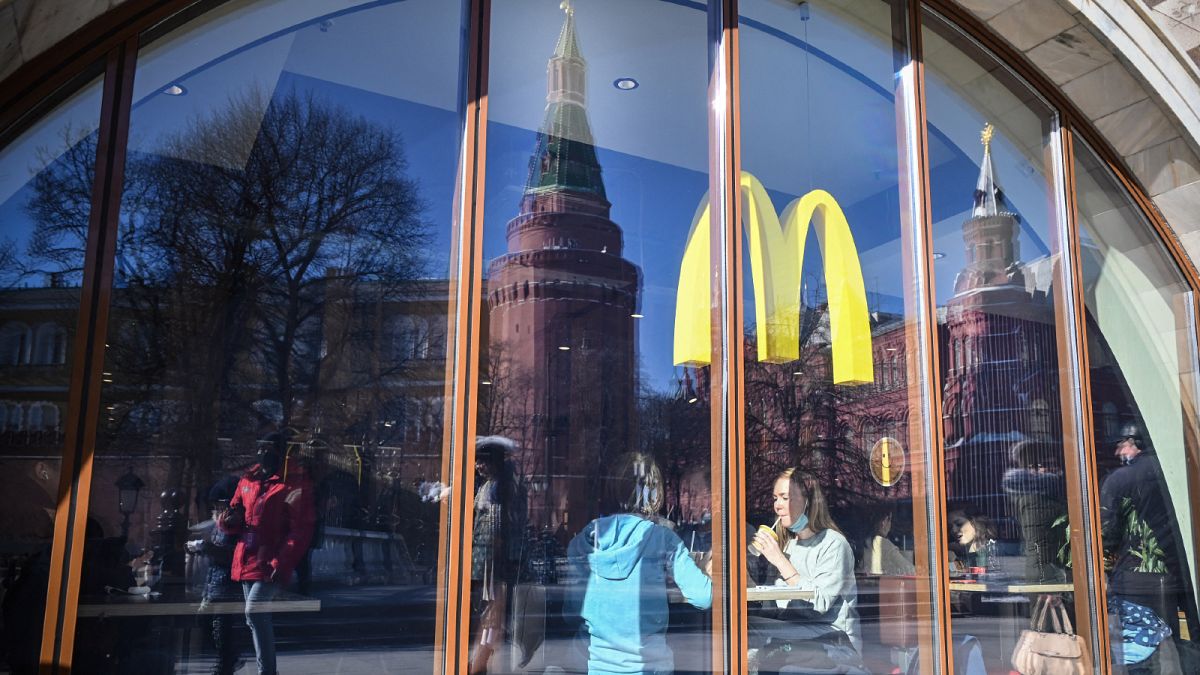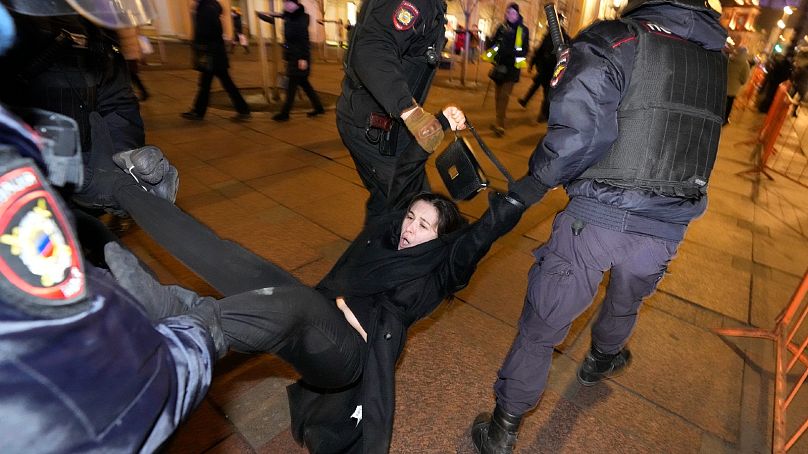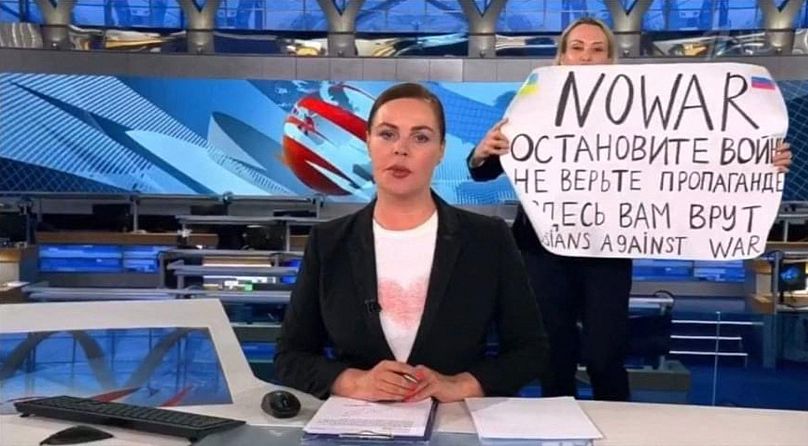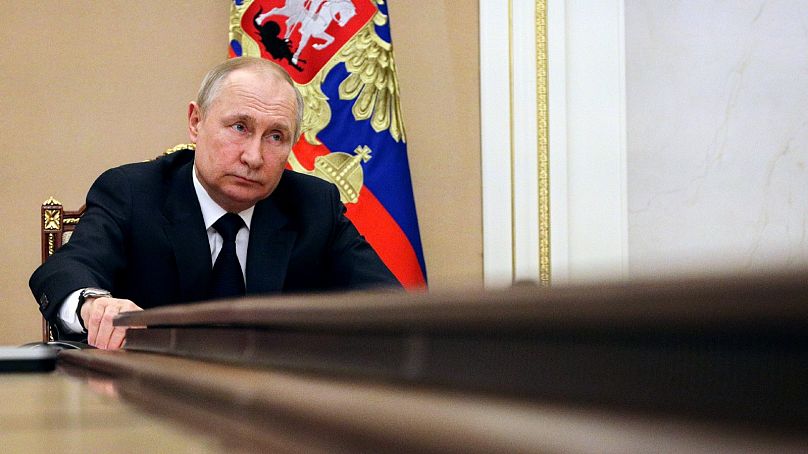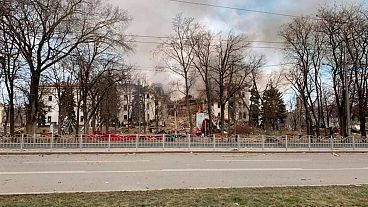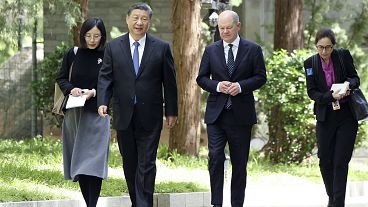With relations between Russia and Europe reaching a new all-time low, what is life like for Westerners in the country?
A month ago, Mark*, a British teacher in Moscow, was making holiday plans with his expatriate friends.
Then, days later, Russian President Vladimir Putin ordered troops into Ukraine and everything changed.
Mark says most of his expatriate friends -- including those with whom he was making travel plans -- have now left.
“I’ve spoken with people who’ve been here for years and have families and have been through a lot, but the Ukrainian invasion is too much,” said Mark, who moved to Russia at the end of 2019. “Even if there is a sense of being protected in Moscow, the risk they feel they’re taking is in relation to war,” he said. “You don’t mess around with that.”
There are no figures for how many expatriates have left, but many of the people Euronews spoke to said a majority of foreigners they knew had left in the last month.
Rumours of martial law
While many Ukrainians have found their lives shattered by war and displacement in the last four weeks, everyday life in Russia’s capital has largely continued as normal. Schools in Moscow are open, the metro is running, and workers are going to their offices.
“No Russian could imagine anyone attacking Russia,” said Sebastien*, a long-term Moscow resident from Germany who works at an accountancy firm. "In terms of day-to-day safety, I don't think they have any real fear.”
Mark, however, said people are nervous about martial law being imposed, which would likely involve the closure of Russian borders, the conscription of younger Russian men and even more powers for the state to censor public information.
Originally from Armagh in Northern Ireland, Hugh McEnaney has been living with his Russian wife in Moscow since 2007, where he runs an English teaching and coaching business.
“My home, my business and my life are here, I don’t want my child living out of a suitcase and eating hotel food in Turkey,” said Hugh.
“But if there’s martial law, I’ll be leaving very quickly.”
Protests
Mark has been avoiding the centre of Moscow where anti-war protests have been taking place. “People are getting arrested left, right and centre,” he says. “It’s not safe.”
According to OVD-Info, an independent NGO which monitors political persecution in Russia, more than 13,000 people have been detained at anti-war protests across Russia since 24 February.
Sebastien says that he was surprised anyone went to the anti-war protests: “Anyone who goes out will be arrested, there's no real doubt about that.”
“You will be arrested, and you don't really know what the long-term consequences of that are in terms of prison, criminal charges, or losing your jobs. If you got arrested, what would happen to your children?” he said.
Media censorship
To stop information about the invasion of Ukraine from spreading, Russian authorities have shut down most social media networks, as well as the remaining free press outlets that had been permitted to continue their work by the Kremlin.
Without a VPN (a virtual private network) that disguises the location of the user, anyone in Russia can no longer access Facebook, Twitter, or Instagram.
“The average 20 or 30 something-year-old living in Moscow, St Petersburg or Kazan can probably keep up to date about what the West is saying about the conflict or "the special operation," and they're probably aware that there are more losses than are being reported,” said Sebastien.
“But,” he added, “if you're talking about the average man - the millions and millions of people who live in smaller towns and villages in Russia - their only access to news will be state news and papers. So, their access to media will be much more limited.”
Banking system under sanction
Following the invasion, the EU imposed sanctions on Russia and barred several Russian banks from using the SWIFT system, which underpins international banking transactions.
As a result of economic measures, the Russian rouble has lost a third of its value since the Ukrainian invasion began. While foreign bank cards and payment platforms like Apple Pay and Google Pay can no longer be used in Russia.
“First the central bank said that people couldn’t withdraw US dollars, then they said you can’t buy US dollars without a large commission, and then there were restrictions on rouble withdrawals,” said Sebastien.
When Mark noticed that his UK bank card was no longer working in Moscow, he withdrew most of his roubles from his bank account in Russia.
Many of his friends didn’t act as quick and have not been able to withdraw cash due to limits put in place by the Russian central bank – “everyone has a story about how it’s affected them.”
Spiralling prices and purchase limits at supermarkets
Supermarkets have imposed limits on the number of items one buyer can purchase. “You can't buy 100 packets of sugar or 25 packets of pasta,” said Sebastien, “they are trying to soften any concept of people trying in bulk.”
“Prices in shops are going up almost daily,” he notes. “Even staples - potatoes, carrots, cabbage, meat - those are a clear percentage higher. I wanted to buy a gas cooker and it was 40% higher within a couple of days.”
“I think the Russian government will very quickly raise people's salaries, pension, social security payments and other payments because people live on them,” he says. “The average pensioner who gets 10,000 roubles can't really survive on it if the prices keep rising.”
“I’m not overly panicked but I am making plans,” says Hugh. “The bulk of my income is in roubles and I don’t plan on getting paid in roubles anymore.”
“There are a lot of businesses which will simply shut down because they cannot buy new stocks,” says Sebastien, “There will be a significant drop off in imports and a number of shops will have to shut down.”
International businesses have severed links with Russia
Following the punitive sanctions regime imposed by Western countries on Russia, international businesses across all industries have decided to sever links with Russia including Apple, BP, Ikea, General Motors, and McDonald's.
These closures have hurt young, educated Russians like Ksenia, who worked at the Moscow branch of a British professional services firm.
“A photographer had just taken my new work photo,” she says, “and then a week later I was told the office was closing down.”
“The average Russian is quite poor, isn't highly educated and is very used to living off the land though,” notes Sebastien. “Millions of people live in small-towns, and they have chickens, dogs and rabbits and sow potatoes.”
“Obviously, war could change a lot but McDonald's closing down is not really going to change much about the average man's life.”
Support for Putin
Ksenia says that she knows “for sure” that most Russian people are against the war, but Hugh and Sebastien have different perspectives.
“From my perspective, Russians are very strong supporters of Putin and what he does,” said Hugh. “I imagine that has dropped a little now, but elderly people here have a lot of respect for him.”
“Russians don't tend to worry,” said Sebastien. “They will often say: ‘We've been through wars, we've been through crises, we've been through perestroika, and this is just another thing to get through. The leader will decide, we'll see where it goes, and we'll get through it.”
*Due to the security situation in Russia, some names in this article have been changed.
